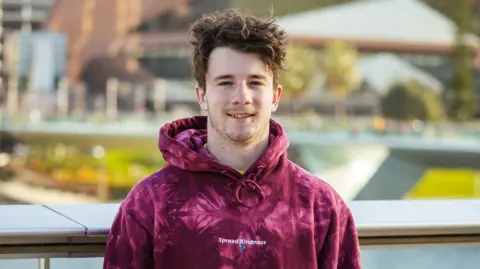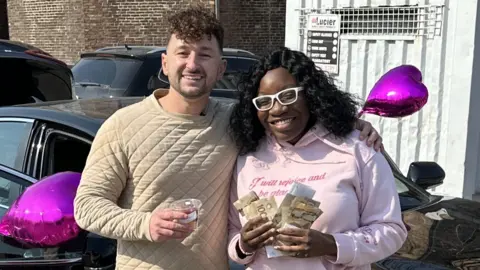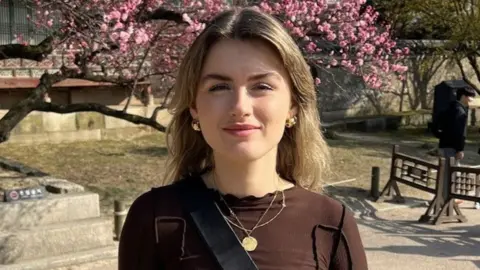Expertise Reporter
 Samuel Weidenhofer
Samuel WeidenhoferRising up, Samuel Weidenhofer struggled together with his psychological well being after shedding his aunt to suicide when he was 9, experiencing a speech obstacle, and being bullied.
The trauma of all of it made him need to finish his personal life, he says. When he was 17, he says he determined to show to social media to unfold a optimistic message.
“It began with easy issues like giving folks hugs in public and giving out roses and flowers and issues that will make folks smile,” says Weidenhofer, now 21, and residing in Melbourne, Australia.
The distinction was Weidenhofer filmed these acts and shared them throughout his social media accounts. The content material spiralled and 4 years later, on Instagram alone he has amassed 1.7 million followers, the place he might be seen shocking an individual with a critical sickness with cash or a go to from a celeb comparable to Jake Paul or Kristen Bell.
“I hope my movies encourage somebody just a bit bit,” he says.
Kindness content material creators, or influencers as they’re usually known as, are rising in numbers on social media.
Their approaches differ however a typical tactic is to secretly movie somebody being given cash, or tickets to a gig or sports activities match, or maybe a free haircut.
“Kindness is cool,” says Zachery Dereniowski, 31, within the bio of his Instagram account the place he has 5.7 million followers.
Mr Dereniowski’s movies usually contain him telling a stranger that he’s hungry and asking for meals. When the particular person helps him out, he rewards the particular person with a present, comparable to a laptop computer, or cash.
“I suppose I need to actually emphasise that each single particular person you come throughout has a narrative… and sometimes the individuals who have the least give essentially the most,” says Mr Dereniowski, who lives in Windsor, close to Toronto in Canada, and began the account after giving free hugs to strangers.
 Patrick Glaz
Patrick GlazLike many influencers, the kindness creators earn money from adverts and sponsorship from the manufacturers they work with. For instance they may do a deal that includes freely giving a selected model’s product.
The movies of kindness content material creators entice thousands and thousands of views. Why are they so well-liked?
Saoirse Cleary, artistic technique director at advertising company MG Empower, says they incorporate most of the parts that each social media algorithms and audiences favour: robust hooks, participating captions, heartfelt narratives, and genuine, unscripted moments.
“Audiences are captivated by uncooked, actual interactions with on a regular basis folks, providing an emotional connection from the consolation of their very own screens. Individuals more and more search positivity, authenticity, and emotional resonance of their on-line experiences, particularly in areas usually saturated with entertainment-driven content material.”
 Saoirse Cleary
Saoirse ClearyOn the face of it the acts appear nicely which means, so why do they entice criticism?
“”Whereas these influencers could also be genuinely beneficiant… the generosity can typically really feel performative, because it usually serves as a technique to entice extra views, engagement, and finally monetary reward, quite than purely altruistic motives,” says Ms Cleary.
Others go additional, questing whether or not focussing on one, normally susceptible particular person, is the suitable manner to assist out.
“I discover the standard arrange of most of the scenes fairly disturbing,” says Hilda Burke, a psychotherapist, accredited with the British Affiliation for Counselling and Psychotherapy.
She explains that the movies usually contain somebody being recognized as “in want”. They’re then requested for a favour. It could be spare cash for a bus fare or assist with one thing.
She argues the participant is being “lured” into valuing the wants of another person, who seems richer, extra extremely than their very own.
Provided that they do which might be they rewarded.
“I ponder what occurs to those that do not play the sport?,” asks Ms Burke.
The influencers defend themselves by arguing that utilizing social media this fashion is an efficient technique.
“I can increase more cash, so I might help extra folks if I publish it on-line,” says Mr Weidenhofer.
And the way about filming folks with out their consent?
“In case you are doing a video the place you are giving a hug to somebody, should you inform them beforehand, it simply takes away that authenticity,” says Mr Weidenhofer.
However he provides that nowadays he avoids filming folks with out consent because it was making him “really feel bizarre”.
Typically giant quantities of cash are given to susceptible folks, which they won’t be ready to handle.
Mr Dereniowski realised that this could be a problem when he raised $240,000 in a single day for a father and son who have been residing of their automobile.
After that, extra thought goes into long run assist.
“We have began establishing monetary advisors. We have began getting these folks jobs. We have helped allocate the funds correctly to repay their debt, their automobile, serving to them get a house and [pay their] lease,” he says.
You probably have been affected by any of the main points on this story, you will get assist and help from the BBC Action Line.

